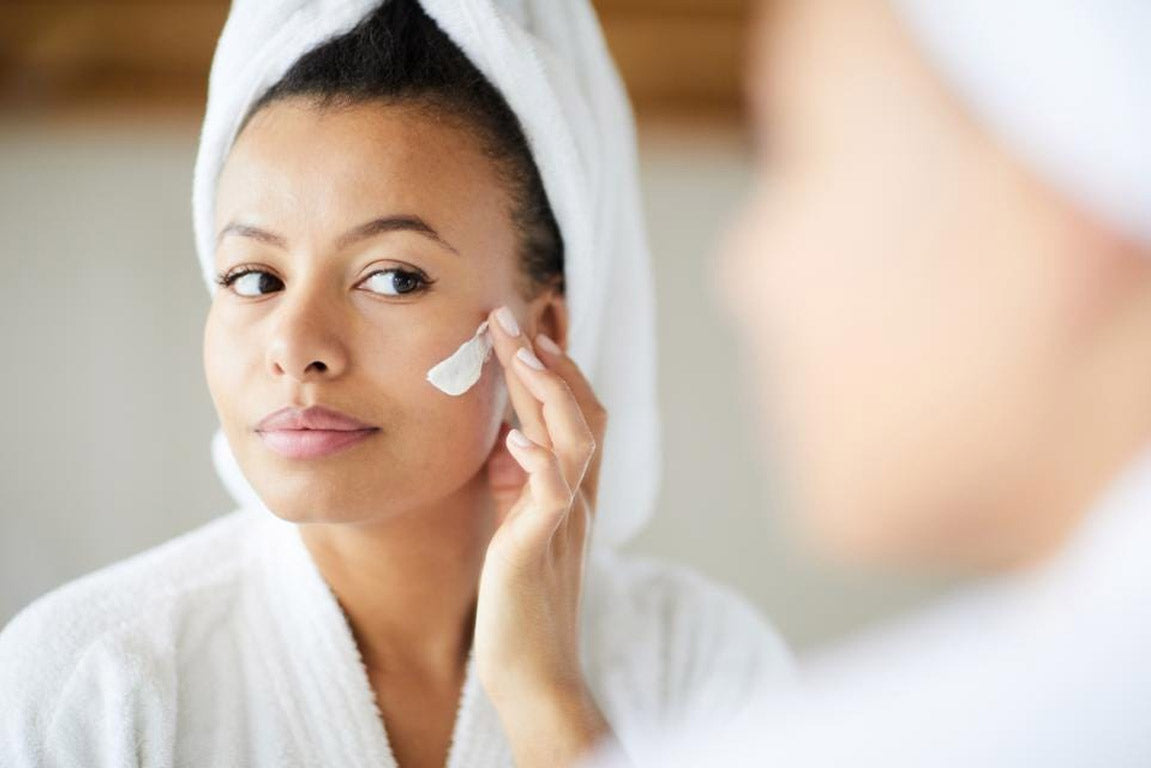Skin Expert Dr. Sethi Shares Her Skincare Insights on the with Whit Podcast
In this blog, we’ll cover:
- Retinol and skin sensitivity
- The dangers of derma rollers
- Maintaining moisture with hyaluronic acid
- Healthy skin cleansing practices
Dr. Simran Sethi, an Internal Medicine doctor and Founder of RenewMD medical spas and Skin by Dr. Sethi, is an expert in professional skincare. On The Skin Report podcast, she uncovers the science-backed facts behind skin biology and treatment so listeners can take a smarter approach to skincare.
with Whit is a leisure and lifestyle series that covers beauty, fashion, relationships, and wellness. Dr. Sethi joins host Whitney Port on this episode to share the inside scoop on the best professional skincare trends, myths, and hot topics. You won’t want to miss these insights, so read on, as this blog will review some of the leading skincare myths discussed in the interview.
Busting Popular Skincare Myths
Myth: Skincare products with retinol always cause skin sensitivity and dryness.
Fact: By using the right products and incorporating them slowly, people can avoid the adverse side effects of retinol while still gaining its anti-aging benefits.
Retinol is known in the skincare universe as the ultimate anti-aging ingredient. But for people with sensitive skin or darker skin tones, the potential side effects of using retinol can be intimidating.
So one wants to experience dry, red, flakey skin. But with the right products, people can incorporate retinol into their routines without going through the skin-sensitivity stage.
Dr. Sethi often hears stories of patients who start retinol but quit once they see the adverse side effects of their skin adjusting to the ingredient. That’s why she created a retinol product, the Retinol Lipid Complex, that gives buyers all the benefits of the component without skin sensitivity.
“The Retinal Lipid Complex is a point 0.5% retinol, which is a medium grade. And that’s the dose that’s been studied to show actually exactly the same results as a 1%”
Although 1% retinol is more potent, this doesn’t mean it will work better than 0.5% retinol. Dr. Sethi has found that after about a month of use, both strengths behave the same way.
She also elaborates on the purpose of including phospholipids within her solution, stating, “Their job is to actually go and mimic the lipids that we naturally have in our skin barrier, to continue to maintain that and keep that nice and strong. So you don’t go through that phase of healing and being inflamed for anywhere from four to six weeks.”
Dr. Sethi suggests using a medium-strength retinol product combined with a phospholipid complex, like the one offered in her product line, for an easier retinol experience.
Myth: Derma rollers are safe and effective to use on the skin.
Fact: Derma rollers are dangerous devices, especially for at-home use.
Dr. Sethi warns buyers about the dangers of derma rollers on with Whit. Derma rollers are intended as an at-home skincare treatment. However, they often do more harm than good.
“So there are a good number of people who use them, and it’s always an issue.” Dr. Sethi explains, “It’s one of those things that is trying to mimic what a procedure we call micro-needling does, like the at-home version of it. And, the problem with that is that micro needling like PicoSure Laser also requires damage in the dermis.”
For a micro-needling tool to be effective, it must be able to puncture the dermis, or the deepest skin layer, to stimulate collagen production, resulting in smoother, bouncier skin. However, Dr. Sethi explains that the derma roller does not reach the dermis and can instead lead to scarring on the skin’s superficial layers.
“Those needles don’t get to the deep layer of the skin. They go in our more superficial layer,” Dr. Sethi says about the derma roller. “They’re actually going to just produce scarring just like a cut in the skin or acne produces. So they’re actually a very dangerous device to use, especially at home.”
Frequent use of the derma roller on the superficial skin layers can promote scarring and pigmentation. So rather than trying to renew your skin with an at-home tool, Dr. Sethi recommends leaving micro-needling skin treatments to the professionals.
Myth: A moisturizer alone is all you need to improve dry skin.
Fact: Using hyaluronic acid can help you improve your moisture barrier – and help your moisturizer do its job.
As Dr. Sethi discusses her skincare line, she highlights the usefulness of hyaluronic acid for its ability to keep the skin healthy and hydrated.
Sometimes when moisturizer alone is applied to the skin, it will begin to feel dry again within just a few hours. Dr. Sethi explains that this is because we are warm-blooded.
“We’re warmer than our environment, so we’re constantly losing water from our skin. And so to prevent that, if you apply a moisture barrier, you will have your moisturizer working.”
Fortunately, products with hyaluronic acid can be helpful for moisture barrier support. Dr. Sethi states, “Hyaluronic acid is essentially a large molecule that absorbs water as it sits on your skin surface. So it really protects any loss of moisture from your skin.”
Within her product line, she offers a hyaluronic acid serum called HA + Firming Boost that is recommended for all skin types.
Myth: You shouldn’t wash your face in the morning
Fact: People should wash their face in the morning and at night.
Many skincare professionals have different ideas and opinions on the best way to maintain clean and healthy skin. Dr. Sethi shares her insights on skin cleansing and explains the science-backed facts on how often to wash your face.
“At night, our skin follows the circadian rhythm just like the rest of our body,” Dr. Sethi explains “we are actively making all our new skin at night.”
Because we are generating new skin as we sleep, the old skin is brought up to the surface. This means that when we wake in the morning, the debris from the skin turnover is present on our faces.
“We actually have a lot more debris on our skin than we think,” she continues, “So washing in the morning is really important, even if you have sensitive skin or dry skin.”
Dr. Sethi suggests using a gentle cleanser, especially if your skin is sensitive or prone to dryness.
Some professionals also recommend not washing the face in the morning to preserve the skin’s natural microbiome. However, she informs listeners that gentle moisturizing cleansers won’t over-strip the skin’s natural oils and are unlikely to disrupt the natural skin biome due to their usually more neutral pH.
Listen to Dr. Sethi discuss more skincare myths on the with Whit podcast by following the links listed below. And don’t forget to tune into The Skin Report for all new episodes coming in season two!



